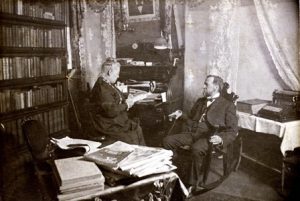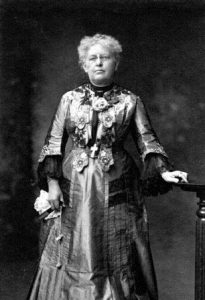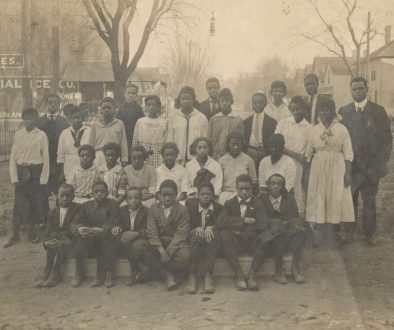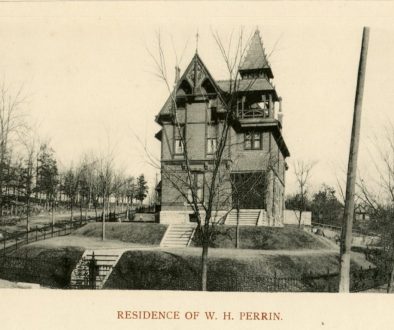Helen Gougar
From the Women’s Suffrage exhibit presented by TCHA in 2020 and 2021. Text prepared by Hannah Craddock Mossman.
Helen Jackson Gougar (1843-1907) worked tirelessly for women’s rights. After graduating from Hillsdale College, Gougar moved to Lafayette in 1860 to take a job as an assistant teacher. She eventually became the principal of Jenks Public School. In 1863, she married attorney John D. Gougar. By 1878, Gougar publicly supported women’s rights and temperance in her column “Bric-A-Brac: Literature, Science, Art and Topics of the Day,” published in the Lafayette Daily Courier. The column ran from 1878 to 1880. In 1881, Gougar edited her own paper focused on suffrage and temperance, Our Herald. In addition to her writings, Gougar campaigned throughout the state speaking in favor of suffrage. In 1881, she addressed the Indiana General Assembly and in 1882, the Indiana Republican Convention, successfully persuading the party to endorse both suffrage and temperance. She was a member of the Blue Ribbon Club, Vice President of the Indiana State Suffrage Society, and Vice President of the National Suffrage Association.
With the support of her husband, Gougar successfully sued Western Union Telegraph Company in 1881 for prioritizing telegraphs from men over women. She was awarded $100. In 1883, Gougar, again with her husband, successfully sued Lafayette Police Chief Harry Mandler after he alleged she was having an affair with Capt. DeWitt Wallace, a candidate for state senate. After arguing Mandler (a Democrat) was attempting to discredit Wallace and Gougar (Republicans) for their pro- temperance and suffrage views, the jury found in favor of Gougar, awarding her $5,000 in damages. The newspapers portrayed the case as a referendum on suffrage and temperance.

In 1894, Gougar attempted to vote in municipal elections. When prevented from doing so, she sued the County Election Board in Gougar v. Timberlake. Gougar was admitted to the Tippecanoe County Bar in 1895, allowing her to make her own case before the county court. She was admitted to the Indiana Bar in 1897, and argued her own case before the Indiana Supreme Court that same year. Before both courts she eloquently argued that the Indiana Constitution did not specifically exclude women from voting and that the Declaration of Independence, the U.S. Constitution, and the 14th and 15th Amendments granted all citizens the right to vote. Despite Gougar’s oratory, the Supreme Court affirmed the lower court’s decision that Gougar, and all other women, did not have the right to vote. Voting was a privilege, not a right, that had to be bestowed by the government.

Gougar died in 1907; 13 years before women were granted the right to vote. However, her arguments on behalf of suffrage helped strengthen the movement’s foundation. One of the original chroniclers of the suffrage movement and fellow Hoosier, Ida Harper, described Gougar as “the best woman organizer in the country.”
Words of wisdom from Helen, taken from Constitutional Rights of the Women of Indiana, 1895
“A right withheld is a wrong inflicted. The ballot is from God, and belongs to the instinct of self-preservation. It is the political defense of this instinct. It belongs, by nature, to every person of responsible age and mind, regardless of color, race or sex.” Pg. 11.
“Without suffrage no citizen is free and with one-half the citizens of a State disfranchised there is no free State or consistent Republican form of government.” Pg. 14
“On behalf of the women citizens of Indiana, it is my prayer that this Court may arise to the dignity of this great occasion, and with unbiased judgment give the decree that shall make me and my sex free.” Pg. 49
“I was denied my ballot by the gentlemen comprising the Election Board of the fourteenth precinct of this city merely because I was a woman. It was not denied but I was a ‘citizen,’ an ‘inhabitant,’ a ‘person,’ one of the people. No one challenged me because I was under twenty-one years of age, a vagabond, an idiot, and election better, a dueller, or for having been convicted of an infamous crime; nor that my term of residence in State, county or precinct was too short, or because I was a soldier, seaman or marine stationed away from my native heath.” Pg. 28
“In the present condition of society, I am constrained to believe that suffrage needs women, more than women need suffrage.” Pg. 35
“The word ‘male’ does not occur in either the Declaration of Independence or the Constitution of the United States. Only citizenship is considered, and women are citizens.” Pg. 26
Visit Helen M. Gougar’s Historical Marker and learn more about Helen:



